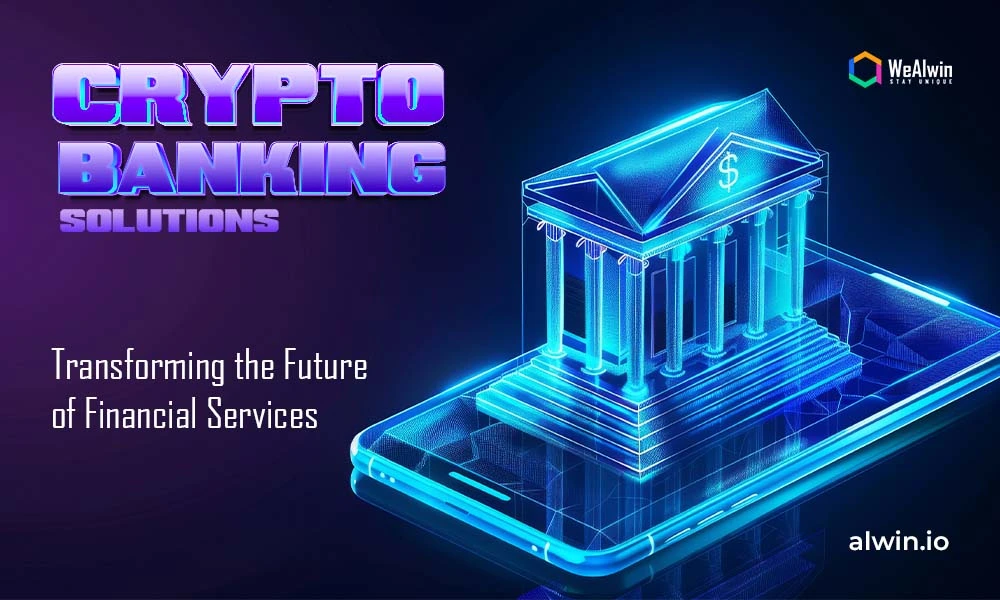The financial world is undergoing a significant transformation with the rise of crypto banking solutions. Far from being a futuristic concept, these solutions are actively reshaping how businesses and individuals manage their money today. As traditional banking systems struggle with inefficiencies, crypto banking offers a compelling alternative that is both practical and innovative.
This blog will show you how crypto banking solutions are transforming finance right now. You’ll learn about their benefits, such as lower fees and better security, and how they can benefit your business. We’ll cover what crypto banking solutions are, the different types available, and how they’re being used today. Plus, we’ll provide tips on how to implement these solutions effectively.
What is Crypto Banking?
Crypto banking refers to financial services that integrate cryptocurrencies with traditional banking functions. These solutions allow users to store, manage, and transact with digital currencies, similar to how they would with traditional money. Crypto banking platforms offer services such as digital wallets, crypto-backed loans, and seamless exchange between cryptocurrencies and fiat currencies.
Here’s a table that clearly outlines the key differences between traditional banking and crypto banking:

What Is Crypto Banking Solutions?
A Crypto Banking Solution is designed for cryptocurrency banking and investment, allowing users to securely buy, trade, and store digital assets. This solution includes features such as bank accounts, debit and credit cards, user-controlled wallets, money transfers, payments, merchant payment gateways, and a cryptocurrency trading desk.
At WeAlwin, we provide a fully integrated crypto-banking solution to help financial and non-financial institutions establish digital asset banks. Our focus is on secure Bitcoin management and digital payment services, utilizing double encryption security and two-way QR technology. Our crypto banking software enables users to transfer funds, make deposits, and apply for credit cards without the need to visit a bank or seek assistance, offering a broad range of financial services through a smooth digital experience.
Market Potential and Opportunities For Crypto Banking Solutions
To grasp the significance of crypto banking solutions, it’s essential to understand the current state of the market. Here are four key statistics that highlight the growth and impact of this sector:
Market Growth: The global crypto banking market is projected to reach approximately $6 billion by 2025, growing at a compound annual growth rate (CAGR) of over 15% from 2023. This rapid expansion reflects increasing adoption and innovation within the industry.
User Adoption: As of 2024, more than 200 million people worldwide are using cryptocurrencies, with a significant portion engaging with crypto banking solutions for transactions, savings, and investments. This widespread adoption underscores the growing acceptance of digital currencies.
Transaction Volume: The total transaction volume of crypto banking platforms has surged past $1 trillion annually. This indicates a high level of activity and trust in these platforms for managing and transferring digital assets.
Investment Trends: Investment in crypto banking startups has seen a notable rise, with venture capital funding exceeding $1.5 billion in 2023. This influx of capital highlights investor confidence in the future potential and scalability of crypto banking solutions.
Expanding Use Cases: The applications of crypto banking are broadening beyond just financial transactions. Sectors such as e-commerce, gaming, and art are increasingly adopting crypto solutions for payments and investments, creating diverse opportunities for businesses.
Key Features of Crypto Banking Solutions
Multi-Currency Support
Functionality: Allows for the management and conversion of multiple cryptocurrencies and fiat currencies within the platform.
Benefits: Facilitates seamless transactions across different currencies, enhancing user flexibility and convenience.
Real-Time Transactions
Importance: Ensures that transactions are processed instantly, providing a smooth and efficient user experience.
Impact: Enhances customer satisfaction by reducing wait times and enabling immediate transaction confirmations.
Advanced Security
Measures: Includes encryption, multi-factor authentication, and regular security audits.
Purpose: Protects user data and financial transactions from cyber threats and unauthorized access, ensuring a secure banking environment.
User-Friendly Interfaces
Design: Focuses on intuitive navigation, clear instructions, and an engaging user experience.
Outcome: Improves customer satisfaction by making the platform easy to use and accessible to all user levels.
Integration Capabilities
Connections: Enables seamless integration with other financial systems, services, and platforms.
Advantage: Facilitates smooth operation across various financial ecosystems, enhancing functionality and expanding service offerings.
White Label Crypto Banking Software
White-label crypto banking software are customizable platform offered by providers to businesses who want to launch their crypto banking services without developing the technology from scratch. These solutions allow companies to rebrand and use the underlying technology as their own, offering a seamless integration of crypto banking features.
Benefits of White-Label Crypto Banking Solutions
Opting for a white-label neo-banking platform offers several advantages:
Cost Efficiency: Reduces development costs and time-to-market by utilizing pre-built technology.
Customization: Allows businesses to tailor the platform's branding and features to fit their specific needs and market.
Scalability: A flexible solution that can grow with the business, adapting to changing needs and expanding features.
How to Choose a White-Label Crypto Banking Software ?
When selecting a white-label crypto banking software, consider:
Technical Compatibility: Ensure the platform integrates well with existing systems and supports required features.
Customization Options: Look for flexibility in branding and feature adjustments to meet your specific business needs.
Regulatory Compliance: Verify that the solution adheres to relevant legal and regulatory requirements in your region.
Vendor Reputation: Assess the provider’s track record and customer reviews to ensure reliability and support.
Types of Crypto Banking Solutions
Crypto-Only Banks
Features: Operate exclusively with cryptocurrencies, offering digital wallets and blockchain integration.
Applications: Include crypto savings accounts, payment solutions, and investment opportunities.
Hybrid Banks (Crypto-Friendly)
Integration: Combine traditional banking services with cryptocurrency functionality, enabling both fiat and digital asset management.
Features: Provide cross-platform transactions and advanced crypto features within a traditional banking framework.
Crypto Payment Processors
Role: Manage cryptocurrency transactions for businesses, including payment acceptance and conversion services.
Applications: Integrate with e-commerce platforms, POS systems, and subscription services.
Crypto Lending Platforms
Overview: Facilitate loans using cryptocurrency as collateral, with flexible terms and instant approval.
Applications: Offer liquidity access and investment diversification without selling digital assets.
Crypto Exchange Platforms
Key Aspects: Enable the buying and selling of cryptocurrencies, with high liquidity and robust security measures.
Features: Provide access to various cryptocurrencies and trading pairs with intuitive interfaces.
How Does Crypto Banking Work?
Crypto banking solutions leverage blockchain technology to offer a range of financial services. Here’s a look at how they function:
Blockchain Technology: At the core of crypto banking is blockchain technology, which is a decentralized ledger that records all transactions across a network of computers. This ensures transparency, security, and immutability of transaction records.
Digital Wallets: Users access their cryptocurrencies through digital wallets, which can be software-based (online or mobile apps) or hardware-based (physical devices). These wallets store the private keys needed to access and manage digital assets.
Crypto Transactions: When a user initiates a transaction, it is broadcasted to the network, where it is verified by network participants (nodes) through a consensus mechanism. Once validated, the transaction is added to the blockchain.
Smart Contracts: Many crypto banking solutions use smart contracts—self-executing contracts with the terms directly written into code. These automate and enforce the terms of agreements without the need for intermediaries.
Integration with Fiat Systems: Crypto banking platforms often integrate with traditional financial systems to facilitate conversions between cryptocurrencies and fiat currencies. This integration helps users manage their digital assets alongside traditional money.
Advanced Security: Crypto banking solutions utilize cryptographic techniques to secure transactions and protect user data. This includes encryption of transaction data and the use of multi-signature authentication for added security.
Regulatory and Compliance using Crypto Banking Solutions
Navigating regulatory and compliance requirements is crucial for crypto banking solutions. Here are the essential considerations:
Know Your Customer (KYC): Crypto banking platforms must implement KYC procedures to verify the identity of their users. This helps prevent money laundering and fraud and ensures that platforms comply with anti-money laundering (AML) regulations.
Anti-Money Laundering (AML): Platforms need to have AML policies in place to detect and report suspicious activities. This includes monitoring transactions for unusual patterns and conducting regular audits.
Data Protection: Compliance with data protection regulations, such as the General Data Protection Regulation (GDPR) in the EU, is essential. Platforms must ensure that user data is stored securely and that privacy rights are respected.
Licensing and Registration: Depending on the jurisdiction, crypto banking platforms may need to obtain specific licenses or register with financial authorities. Regulations vary by country, so understanding local legal requirements is crucial.
Consumer Protection: Ensuring that user funds are protected and that there are clear terms of service is important for consumer trust. Platforms should also have mechanisms for resolving disputes and addressing user complaints.
Security Standards: Adhering to industry security standards and best practices helps protect against cyber threats and breaches. This includes implementing robust encryption, regular security audits, and secure coding practices.
Why Consider Crypto Banking Software for Your Business?
1. Improved Security: Crypto banking platforms use advanced cryptographic techniques to secure transactions and protect user data. With decentralized networks and blockchain technology, the risk of fraud and hacking is significantly reduced compared to traditional banking systems.
2. Cost-Effectiveness: Traditional banking often involves high fees for transactions, especially international ones. Crypto banking reduces these costs by eliminating intermediaries and streamlining the transaction process, resulting in lower fees and faster transfers.
3. Enhanced Features: Crypto banking solutions offer features that go beyond those of traditional banks. These include:
- Real-Time Transactions: Instant processing of transactions and payments, regardless of time or location.
- Global Accessibility: Easy access to banking services from anywhere in the world, breaking down geographical barriers.
- Customizable Solutions: Flexibility in designing banking solutions tailored to specific business needs, including white-label options.
4. Innovative Financial Products: Crypto banking platforms often provide cutting-edge financial products such as crypto-backed loans, yield farming and staking opportunities, offering businesses and individuals new ways to grow their assets.
5. Greater Transparency: Blockchain technology ensures that all transactions are recorded and visible on a public ledger. This transparency helps build trust and accountability, as users can track and verify transactions easily.
How to Implement Crypto Banking Solutions?
1. Market Research
Objective: Understand market trends, customer needs, and competitive landscape.
Approach: Analyze current crypto banking trends, identify gaps in the market, and assess potential customer demands to tailor your solution effectively.
2. Platform Architecture
Design: Build a scalable and flexible platform that can handle increased traffic and transactions as your business grows.
Considerations: Ensure the architecture supports future enhancements and integrates well with other financial systems.
3. User Experience
Focus: Create an intuitive, user-friendly interface that enhances customer engagement.
Strategies: Simplify navigation, provide clear instructions, and ensure a seamless onboarding process for users.
4. Blockchain Integration
Integration: Securely embed blockchain technology to ensure transparent and immutable transactions.
Implementation: Choose reliable blockchain protocols and ensure they align with your platform’s security and scalability requirements.
5. Security Measures
Features: Implement advanced security protocols to protect against cyber threats.
Practices: Use encryption, multi-factor authentication, and regular security audits to safeguard user data and transactions.
6. Launch and Feedback
Launch: Roll out your crypto banking solution with a strategic launch plan.
Feedback: Collect user feedback post-launch to identify areas for improvement and refine the platform based on real-world use.
7. Expansion and Partnerships
Growth: Develop strategies for scaling your platform, such as adding new features or expanding to new markets.
Partnerships: Form strategic alliances with other businesses or financial institutions to enhance your service offerings and reach a broader audience.
Cost and Financial Considerations For Crypto Banking Software
Initial and Ongoing Costs
Setup Expenses: Includes development, licensing, and integration costs for establishing a crypto banking platform.
Maintenance: Covers ongoing costs such as server upkeep, security updates, compliance management, and customer support.
Revenue Models
Subscription Fees: Charge users a regular fee for accessing premium features or services.
Transaction Fees: Earn revenue by taking a small percentage from each transaction processed through your platform.
Partnerships: Generate income through strategic partnerships, offering value-added services or cross-platform integrations.
Attracting Customers
Marketing Strategies: Utilize targeted advertising, social media campaigns, and influencer partnerships to raise awareness and attract users to your crypto banking platform.
User Acquisition: Offer incentives such as sign-up bonuses, referral programs, and exclusive features to encourage new user registrations.
Customer Support Systems
Support Channels: Provide multiple support options including live chat, email, and phone support to address user concerns promptly.
User Assistance: Implement FAQs, tutorials, and chatbots to help users navigate the platform and resolve common issues efficiently.
Future Trends and Innovations in Crypto Banking
AI and Machine Learning: How these technologies are being integrated into crypto banking for enhanced security, fraud detection, and personalized user experiences.
DeFi Integration: The rise of decentralized finance (DeFi) and its potential to further disrupt traditional banking models.
Mainstream Adoption: Expectations for increased acceptance of crypto banking by mainstream financial institutions and consumers.
Regulatory Evolution: Anticipated changes in global regulations that will shape the future of crypto banking.
Why Choose a Professional Crypto Banking Development Company?
Expertise in Blockchain and Crypto Technology: Professional developers bring specialized knowledge in blockchain and cryptocurrency, ensuring that your crypto banking solution is secure, efficient, and compliant with industry standards.
Custom-Tailored Solutions: Experienced developers can create solutions that are specifically designed to meet your business needs, whether it’s integrating advanced security features or creating a seamless user interface.
Efficient and Scalable Development: Professionals ensure that your platform is built to scale, allowing for easy expansion as your business grows and the market evolves.
Regulatory Compliance: Navigating the complex landscape of crypto regulations can be challenging, but a seasoned development team ensures your platform meets all necessary legal and compliance standards.
Proven Track Record: WeAlwin Technologies has a history of delivering top-notch crypto banking solutions that are secure, reliable, and tailored to the unique needs of our clients.
Comprehensive Support and Maintenance: Beyond development, WeAlwin Technologies offers ongoing support and maintenance to ensure your platform remains up-to-date with the latest technological advancements and regulatory changes.
Innovative Approach: Our team is committed to innovation, constantly exploring new technologies and methodologies to provide you with cutting-edge solutions that give you a competitive edge in the market.
Client-Centric Focus: We prioritize our client’s goals and work closely with them throughout the development process to ensure the final product aligns perfectly with their vision and business objectives.
We've explored the essentials of crypto banking solutions, including their definition, key features, and how they differ from traditional banking. As crypto banking continues to evolve, its potential to revolutionize the industry becomes increasingly clear. If you’re considering venturing into this innovative space, partnering with a cryptocurrency exchange development company like WeAlwin Technologies can provide the expertise and support you need for successful implementation. Embrace the future of finance with crypto banking and stay ahead of the curve.



